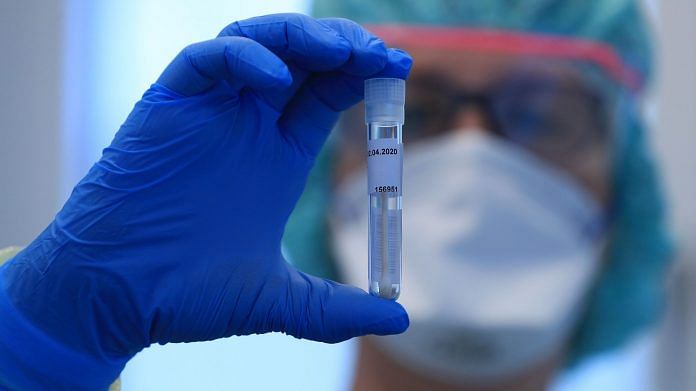New Delhi: Over 2 million people have been infected by the novel coronavirus so far, yet a lot remains to be understood about the virus that has brought the world to a standstill.
With an understanding of the novel coronavirus and strategies to fight the pandemic evolving every hour, ThePrint brings you a round-up of the latest research and development on Covid-19 from across the globe.
US starts clinical trial to evaluate use of ‘gimsilumab’
Scientists in the US have begun a clinical trial to evaluate if gimsilumab — an artificially synthesised antibody — can reduce death risk among patients with Covid-19.
Researchers at the Temple University Hospital have already begun treating their first patient using this therapy. Many Covid-19 sufferers experience an overactive immune response that leads to lung injury, acute respiratory distress syndrome (ARDS), and ultimately death.
Gimsilumab is a monoclonal antibody targeting granulocyte macrophage-colony stimulating factor (GM-CSF), which is believed to be a key driver of lung hyper-inflammation.
Identical to antibodies that are naturally produced by human bodies, monoclonal antibodies are made in a laboratory using cloned or mice immune cells.
The clinical trials in the US will evaluate whether intravenous treatment with gimsilumab can help reduce development of ARDS, a life-threatening inflammatory lung injury characterised by lack of oxygen to the tissues and stiff lungs.
The trial will enroll up to 270 patients with a confirmed diagnosis of Covid-19 and clinical evidence of acute lung injury or ARDS.
Guidebook to scale up ability to deliver blood plasma therapy
A team of experts at the Johns Hopkins University has created a clinical guidebook to help hospitals and medical centres rapidly scale up their ability to deliver convalescent plasma therapy — promising treatment against the novel coronavirus.
The therapy leverages the immune system by introducing the plasma portion of blood from people who have recovered from Covid-19 into other patients.
The guidebook, published in the Journal of Clinical Investigation, can help healthcare providers ramp up their ability to deliver this therapy, the researchers said.
India has also started conducting convalescent plasma therapy clinical trials.
Also read: In India, over 32 crore students hit by Covid-19 as schools and colleges are shut: UNESCO
New robot can disinfect large surfaces
Researchers from the Nanyang Technological University, Singapore (NTU Singapore), have developed a robot that can disinfect large surfaces quickly.
Named eXtreme Disinfection roBOT (XDBOT), it can be wirelessly controlled via a laptop or tablet, removing the need for human cleaners to be in contact with surfaces.
Researchers hope this robot will help reduce the risk of people getting infected from potentially contaminated areas. Existing disinfection robots can primarily clean and vacuum floor surfaces, and are unable to disinfect odd-shaped exteriors or anything above ground level.
Comprising a semi-autonomous control unit with motorised wheels, XDBOT has a six-axis robotic arm that can mimic human movement to reach awkward locations such as under tables and beds, as well as doorknobs, tabletops and light switches.
Diaphragm pacing device to wean patients off ventilators
The US Food and Drug Administration (FDA) has approved the use of TransAeris Diaphragmatic Pacing Stimulator System to help wean any patient off the ventilator, including Covid-19 sufferers.
The device functions with temporary small electrodes implanted by minimally invasive surgery to stimulate the diaphragm — the muscle that helps us breathe.
Developed by Synapse Biomedical, a spinoff company from University Hospitals Cleveland Medical Center (UH) and Case Western Reserve University (CWRU), the device has the potential of freeing up ventilators as patients could be moved off ventilators and placed on the diaphragm pacing system.
“The ability to decrease the need for mechanical ventilation will allow more ventilator units for other patients at need,” said Raymond Onders, professor of surgery at CWRU.
Also read: How Pushkar, a tourist hotspot in Rajasthan, escaped the deadly Covid-19 pandemic




New Delhi or New york
Covid_19 has thrown a challenge to us, it is only a trailer of what is going to come. The future viruses will be easy to spread and life threatening, they give a very small window for us to realise and study what it actually is to come up vaccine. Lot of work for medical researchers imagining the future
Whatever the Therapy , Treatment or Cure, it should come in Time. Otherwise it defeats the very purpose for which it was invented . To save a very many many Lives !